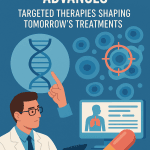The age of “one-size-fits-all” medicine is fading fast. Today, the healthcare landscape is undergoing a seismic shift—moving away from generic approaches and embracing precision medicine, where treatment is custom-tailored to the individual’s unique genetic makeup, environment, and lifestyle. At the core of this revolution lies targeted therapies, which are not just transforming patient outcomes—they’re reshaping how we define medicine itself.
The dream of treating each person based on their specific biological fingerprint is no longer futuristic—it’s happening now. Through cutting-edge genomics, biomarker research, and real-time data analytics, we are witnessing the rise of personalized, precise, and predictive treatments. This isn’t just a leap in medical innovation; it’s a leap in hope, healing, and human potential.
In this comprehensive exploration, we dive deep into the world of precision medicine advances and how targeted therapies are shaping tomorrow’s treatments—from cancer care to autoimmune diseases and beyond.
Understanding Precision Medicine
Precision medicine refers to medical care designed to optimize efficiency and therapeutic benefit for particular groups of patients—especially by using genetic or molecular profiling.
Unlike traditional medicine, which often uses standardized protocols for all patients with a certain disease, precision medicine asks:
- What genetic mutations does this patient have?
- What specific pathways are involved in their disease?
- How will their body metabolize a drug?
- What environmental or lifestyle factors influence their condition?
By answering these questions, doctors can select the most effective treatment with the fewest side effects—maximizing outcomes while minimizing harm.
The Science Behind Targeted Therapies
Targeted therapies are drugs or other treatments that focus on specific molecules involved in the growth and spread of disease—usually cancer or chronic conditions. These treatments:
- Interrupt specific signaling pathways in cells
- Block mutations that drive disease
- Enhance the immune system’s ability to attack diseased cells
- Spare healthy cells, reducing collateral damage
Most targeted therapies are developed based on biomarker identification, which involves discovering unique genetic or protein markers associated with disease progression or drug response.
Common types of targeted therapies include:
- Monoclonal antibodies that bind to specific proteins on diseased cells
- Small molecule inhibitors that interfere with cellular processes
- Immunotherapies that enhance the body’s natural defenses
- Gene therapies that replace or silence faulty genes
This shift from general to precise is redefining what it means to “treat” a disease.
Precision Medicine in Cancer Care: A Paradigm Shift
Nowhere is the impact of precision medicine more profound than in oncology. Traditional chemotherapy affects all rapidly dividing cells—cancerous or not. Targeted therapies, however, act like snipers instead of carpet bombers.
Breast Cancer and HER2-Targeted Therapy
One of the earliest examples is trastuzumab (Herceptin), which targets HER2-positive breast cancer. Patients with this genetic subtype respond dramatically better than those without the mutation. This opened the door for further biomarker-driven treatments.
Lung Cancer and EGFR, ALK, and ROS1 Mutations
Lung cancer therapies like osimertinib (targeting EGFR mutations) or crizotinib (targeting ALK fusions) have drastically extended survival in patients whose tumors carry these alterations.
Melanoma and BRAF Inhibitors
Drugs like vemurafenib and dabrafenib target BRAF mutations in melanoma, shrinking tumors and improving progression-free survival.
These advances aren’t just helping patients live longer—they’re helping them live better, with fewer side effects and more hope.
Beyond Cancer: Expanding the Horizons of Precision Medicine
While oncology paved the way, precision medicine is now making strides in other areas.
Cardiovascular Disease
Genetic testing can identify individuals at risk of inherited heart conditions like familial hypercholesterolemia. Drugs like PCSK9 inhibitors are targeted at specific lipid pathways, significantly reducing cardiovascular events in high-risk patients.
Neurology and Neurodegeneration
Precision medicine is playing a role in identifying biomarkers for Alzheimer’s disease, Parkinson’s, and rare genetic disorders like Huntington’s disease. Early intervention, based on genetic risk, may one day slow or prevent cognitive decline.
Autoimmune and Inflammatory Diseases
Targeted therapies like TNF-alpha inhibitors and JAK inhibitors are helping treat conditions like rheumatoid arthritis, Crohn’s disease, and psoriasis by interfering with inflammatory pathways unique to each patient’s disease state.
Rare Genetic Disorders
From spinal muscular atrophy to cystic fibrosis, precision therapies are offering life-saving treatment for previously untreatable conditions. Drugs like Spinraza and Trikafta are designed based on the exact genetic mutation driving disease.
How Genomic Sequencing Powers Precision Medicine
None of these advancements would be possible without genomic sequencing. By analyzing a patient’s entire DNA, scientists can identify mutations, polymorphisms, and structural changes that guide treatment choices.
Types of sequencing in use:
- Whole Genome Sequencing (WGS)
- Whole Exome Sequencing (WES)
- Targeted Gene Panels for specific conditions
Sequencing technologies have become faster, cheaper, and more accurate, making genetic data more accessible than ever before. As a result, personalized treatment is no longer limited to elite research hospitals—it’s reaching community clinics and even at-home testing kits.
The Role of Biomarkers in Therapy Selection
A biomarker is a measurable indicator of a biological condition or response. In precision medicine, biomarkers help:
- Identify disease subtypes
- Predict treatment response
- Monitor therapy effectiveness
- Detect relapse or resistance
For example:
- PD-L1 levels determine eligibility for certain immunotherapies
- BRCA mutations influence breast and ovarian cancer therapy
- KRAS mutations in colon cancer guide treatment selection
The more we discover about biomarkers, the more we refine and personalize medical treatment.
AI and Big Data in Precision Medicine
With mountains of genetic, clinical, and lifestyle data being generated, artificial intelligence (AI) is essential in analyzing patterns and generating insights.
AI helps by:
- Identifying new therapeutic targets
- Predicting drug responses based on genetic markers
- Personalizing drug dosing using real-time biometrics
- Designing new drug molecules faster and more accurately
AI-powered platforms can process billions of data points in seconds, empowering physicians with data-driven insights that improve clinical decisions.
Drug Development: Faster, Smarter, Personalized
Precision medicine is also changing how we develop drugs. Traditional drug development is long, expensive, and has a high failure rate. Precision-focused strategies are:
- Designing drugs for specific genetic targets
- Running basket trials, where patients with different diseases but the same genetic mutation receive the same therapy
- Using adaptive trial designs to test multiple therapies simultaneously
This approach reduces costs, accelerates approvals, and brings life-saving treatments to market faster.
Real-World Applications and Case Studies
The NCI-MATCH Trial
Run by the National Cancer Institute, this trial matches patients to therapies based on genetic abnormalities in their tumors rather than the cancer type. It’s helping prove that genetics may matter more than location in cancer therapy.
The All of Us Research Program
This ambitious NIH initiative aims to gather data from one million Americans to understand how genes, environment, and lifestyle affect health, guiding future precision therapies.
FoundationOne and Guardant Health
These companies offer advanced genomic profiling and liquid biopsies to help oncologists personalize treatment in real-time, even as cancer evolves.
Challenges and Considerations
While precision medicine is revolutionary, it comes with challenges:
Accessibility and Cost
Genomic testing and targeted therapies can be expensive. Insurance coverage varies widely, creating inequities in access.
Data Privacy and Consent
As genetic data becomes integral to care, protecting patient privacy and ensuring ethical use of data are paramount.
Variability in Clinical Application
Not all physicians are trained in genomics, and not all institutions are equipped to interpret complex data. Ongoing education and infrastructure are essential.
Resistance and Mutation Escape
Cancer and pathogens can evolve, developing resistance to targeted therapies. Ongoing monitoring and combination strategies are key.
The Future: Toward a Fully Personalized Healthcare Ecosystem
What might the future hold?
- Digital twins: Virtual replicas of patients to simulate treatment responses before administering drugs
- Real-time therapy adjustments using wearable data and biosensors
- Gene editing therapies to correct mutations at the DNA level
- Customized vaccines based on a patient’s tumor signature
Imagine a world where your treatment isn’t based on averages, but on you—your DNA, your biology, your behavior. That world is no longer far off.
FAQs
Precision medicine tailors treatment based on an individual’s genetics, lifestyle, and environment, aiming for the most effective and least harmful outcome.
Targeted therapies act on specific molecular pathways involved in disease, whereas traditional treatments (like chemotherapy) affect a broader range of cells, often including healthy ones.
Yes. Precision medicine is increasingly used in cardiology, neurology, infectious diseases, rare genetic disorders, and more.
Often yes. Genomic sequencing helps identify mutations or biomarkers that guide therapy selection, but not all precision therapies require full genetic profiling.
Access is expanding but varies based on location, insurance, and healthcare infrastructure. Efforts are ongoing to make these therapies more inclusive and affordable.
Future advances will include AI-designed drugs, real-time responsive treatments, gene editing, and integration with wearable tech for continuous monitoring.








Post a comment